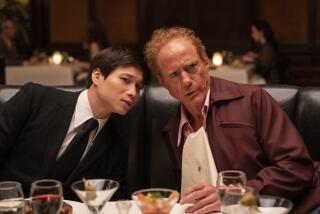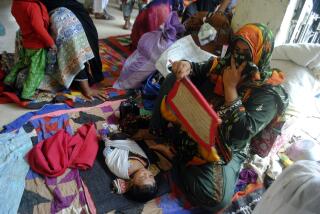West Grows Weary, Refugees Grow Wearier--It’s Too Much
- Share via
He must be having a good laugh, watching me trying to write about him. He knows that I’m after the impossible.
In truth, there is not much to say. I never saw the man. I could not tell you if he stood tall or short, weighed very much, if his hair was thick or thin. I could not tell you if he had a wife or children. Nor could I give you subtler descriptions--the color of his eyes, for example, and whether they looked at you when he spoke. We never met. He hanged himself before that could happen.
What makes me press on anyway is the thought that I know generally what his life was like toward the end, for I walked the streets that he walked, breathed the air that he breathed; I smelled the same odors that must have gone up his nose.
In the refugee camps of Hong Kong, thousands of Vietnamese boat people remain stranded, unwanted by the West that has grown tired of them.
Of the 8,000 in Hong Kong, officials say, more than 5,000 arrived before 1983, and nearly 1,000 of them came before 1979. This adds up to many thousands of days spent burning with the desire for freedom, long before this one man put a rope around his neck and stepped off into oblivion.
But was it a rope? Could it have been his belt? Did he step determinedly and get jerked into death, or did his feet paw at air, hesitantly searching for the footing, the refuge, that he couldn’t find in life? I don’t know, and I admit, ashamedly, that I didn’t try hard enough to find out. I had to catch a plane back home; my schedule was tight.
The few murmured details that I did learn were these:
The man escaped by boat from Vietnam and reached Hong Kong, but eventually got into trouble. He was arrested, and served time. Afterward he tried to reform, but it was too late. Resettlement countries, which have come to ignore cases much more attractive than his, wouldn’t touch him. The rejection proved too much to bear.
“He was educated, smart,” a refugee worker told me. “He just couldn’t take the camps, living from meal to meal. He looked two steps down the road and saw nothing.”
In other words, before he chose death he knew that he was a ghost, a person whose suicide would just be a formality. Indeed, he had discovered that he was a refugee crisis of one. No network news broadcasts would ever devote coverage to his predicament, and no aid organizations would muster resources strictly on his behalf. Rock groups? Who would sing a note, let alone give a concert, for a single nobody? And he’d never had a chance to become a spy, a sports figure or a ballet star--the sort of people who draw attention from governments.
Social workers, however, would mark him. In their book he would be a “successful suicide attempt.” He wouldn’t imitate others who overdose, survive and then show up to discuss their frustrations with counselors--the half-serious kind who play at suicide simply to get a shred of attention in their forsaken surroundings. No, he was through talking; it was clear that he wasn’t wanted anywhere. He really was going to kill himself.
Blindness, denial, neglect in the world beyond refugee camps--such are the causes of these deaths. They are strange affairs, too. Whenever they occur, laughter rises from a dead man.
More to Read
Sign up for Essential California
The most important California stories and recommendations in your inbox every morning.
You may occasionally receive promotional content from the Los Angeles Times.










